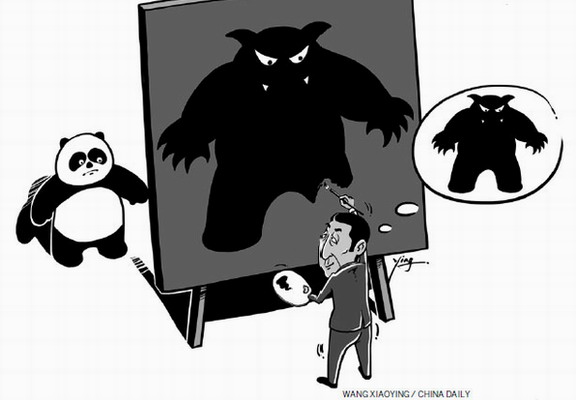Right-wingers use pretenses to remilitarize Japan
Updated: 2015-08-01 09:35
By Wen Zongduo(China Daily)
|
||||||||
 |
Pretending to be "victims" is an art that Japanese militarists and right-wingers mastered long ago and still manipulate repeatedly to veil their aggressiveness.
While people across the world are celebrating the 70th anniversary of the defeat of fascism, Japanese right-wingers say, thanks to the atomic bombs, they are the real victims of World War II, without mentioning "why" .
On Dec 7, 1941, Japanese militarists used the pretext of being under threat from the US military in the Pacific to launch the sudden attack on Pearl Harbor even though America was playing neutral in WWII until then.
Earlier, the Japanese made the excuse of being the "victims" in the Fast East to implement their decade-long schemes of taking over China. On July 18, 1931, they bombed the railways under their control inside China, put the blame on Chinese and rolled their troops across Northeast China. Then on July 7, 1937, they pretended to have lost a Japanese soldier near the Marco Polo Bridge to embark on a full invasion of China.
Japanese militarists and right-wingers have calculated their charade and targets, as they are used to bullying the weak and ballyhooing the strong. Making the disparaged Chinese serve Japanese interests was their strategic goal before and during WWII. Today they grudge the presence of US officers and war machines on Japanese soil and yet flatter Washington, revealing their true nature: snake in the grass.
Although Chinese people have been fishing in the waters of Diaoyu Islands in the East China Sea for centuries, the Japanese claimed them as theirs and "nationalized" them in 2012. When China tried to defend its sovereignty over the islands, Japanese right-wingers added to the clamor of the "China threat" theory.
The latest pretense comes from Japanese Prime Minister Shinzo Abe. While seeking support for his controversial security bills in the upper house of parliament on Monday, he tore off his diplomatic mask and pointed the finger directly at China, thus confirming Japanese media reports that he had told a private gathering earlier that his security bills were targeted at China.
Abe's coalition government seems to be railroading the security bills through parliament because it enjoys majority in both houses. In the name of exercising the right to "collective self-defense", his administration is fundamentally disabling Japan's pacifist Constitution, smashing legislative barriers and assuming the power to deploy its forces overseas even if it is not facing any national threat.
Behind the fa?ade of such self-defense is Abe's dream of reviving the failed bid of his grandfather Nobusuke Kishi, a Class-A war crimes suspect before becoming prime minister in 1957, to remilitarize Japan.
At home, the Abe administration is portraying China as a "threat" to spread the "culture of fear" and coerce approvals for the bills; abroad, it is exploiting US military aspirations to get funds and logistic help to advance Tokyo's military agenda: Why shouldn't Japan send its military abroad when the US has military bases in Japan and other countries?
Therefore, the "China threat" theory is merely a convenient ploy for Abe and his fellow right-wingers to throw off the seven-decade "constitutional yoke" on Japan to re-embark on the path to militarism.
It is clear that Japan's right-wing clique will continue to apply this ghostly logic of portraying Japan as a victim whenever China makes a move in the East China Sea or the South China Sea. Such a deceitful mindset of these Japanese will allow China to do nothing except surrendering all its islands and islets as well as the right to defense in the region.
And still, the mere existence of Chinese military on the open sea can be used to claim China is a threat!
The author is a writer with China Daily. wenzongduo@163.com
- Global health entering new era: WHO chief
- Brazil's planning minister steps aside after recordings revelation
- Vietnam, US adopt joint statement on advancing comprehensive partnership
- European border closures 'inhumane': UN refugee agency
- Japan's foreign minister calls A-bombings extremely regrettable
- Fukushima impact unprecedented for oceans: US expert

 Stars of Lijiang River: Elderly brothers with white beards
Stars of Lijiang River: Elderly brothers with white beards
 Wealthy Chinese children paying money to learn British manners
Wealthy Chinese children paying money to learn British manners
 Military-style wedding: Fighter jets, grooms in dashing uniforms
Military-style wedding: Fighter jets, grooms in dashing uniforms
 Striking photos around the world: May 16 - May 22
Striking photos around the world: May 16 - May 22
 Robots help elderly in nursing home in east China
Robots help elderly in nursing home in east China
 Hanging in the air: Chongqing holds rescue drill
Hanging in the air: Chongqing holds rescue drill
 2.1-ton tofu finishes in two hours in central China
2.1-ton tofu finishes in two hours in central China
 Six things you may not know about Grain Buds
Six things you may not know about Grain Buds
Most Viewed
Editor's Picks

|

|

|

|

|

|
Today's Top News
Liang avoids jail in shooting death
China's finance minister addresses ratings downgrade
Duke alumni visit Chinese Embassy
Marriott unlikely to top Anbang offer for Starwood: Observers
Chinese biopharma debuts on Nasdaq
What ends Jeb Bush's White House hopes
Investigation for Nicolas's campaign
Will US-ASEAN meeting be good for region?
US Weekly

|

|









